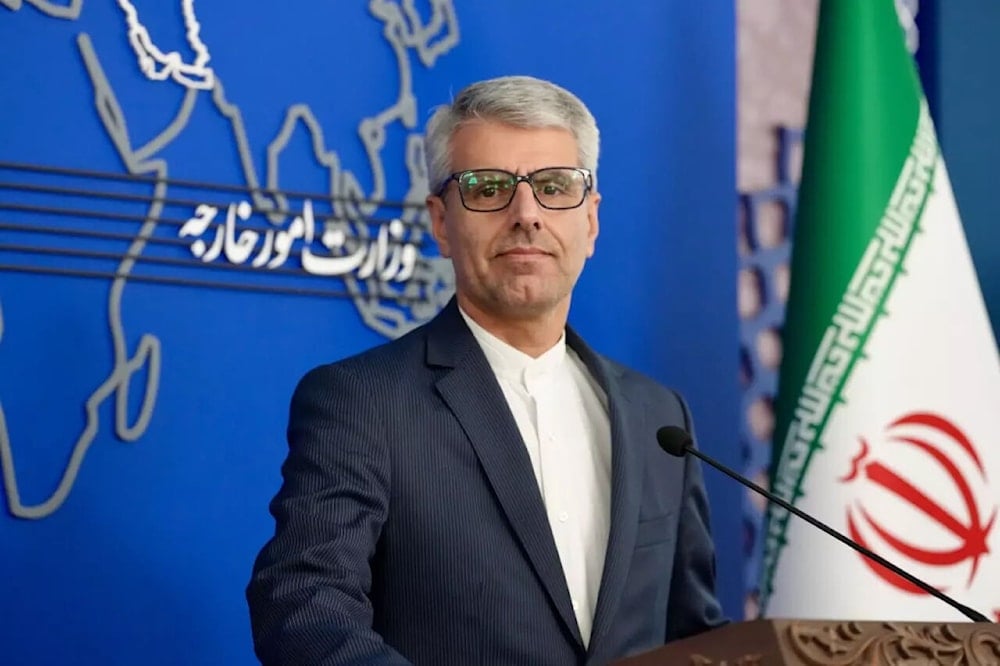Iran condemns IAEA resolution, accuses US and 'Israel' of interference
Iran says the latest IAEA Board resolution is politically driven, accusing the US and “Israel” of creating the dispute by targeting its peaceful nuclear program.
-

Iranian Foreign Ministry spokesperson Esmail Baghaei. (IRNA)
Iran has strongly criticized the recent International Atomic Energy Agency (IAEA) Board of Governors resolution targeting Tehran, calling it politically motivated and harmful to the agency’s credibility. Foreign Ministry spokesperson Esmaeil Baghaei on Monday described the text as “a stain on its designers and sponsors.”
Baghaei said the measure contradicts United Nations Security Council regulations and past IAEA procedures, arguing that it ignores what he called “the crime of the Zionist regime and the United States in attacking Iran’s peaceful nuclear facilities.” He accused the authors of creating further tension by omitting the origins of the dispute.
He rejected the resolution’s demand, backed by three European states, for Iran to resume negotiations linked to rescinded Security Council resolutions, saying the approach is counterproductive. “It does not help solve the issue and will only make the matter more complicated,” he claimed, adding that the resolution reflects “clear interference” in the agency’s functioning.
Baghaei says Washington lacks seriousness in talks
Responding to questions about potential mediation between Tehran and Washington, Baghaei said the main challenge stems from US behavior. “The problem goes back to the US approach and policy,” he argued, accusing Washington of treating diplomacy as “dictation” rather than engagement.
“As long as the United States insists on this approach, no meaningful negotiation will take shape,” he said.
On the issue of nuclear cooperation, Baghaei said Russia’s stance aligns with UN Security Council Resolution 2231, which affirms Iran’s right to peaceful nuclear activities once sanctions provisions expire.
He noted that talks on expanding Iran-Russia civilian nuclear cooperation are continuing “seriously as before,” and said Moscow’s position rejects attempts by Western governments to revive repealed Security Council measures.
Iran formally terminates Cairo agreement with IAEA
On Wednesday, Iranian Foreign Minister Abbas Araghchi announced that Iran has formally terminated the Cairo agreement with the International Atomic Energy Agency (IAEA), stating that an official letter was sent to Director General Rafael Grossi declaring the arrangement "no longer valid and officially ended."
Araghchi stated that the understanding had already been nullified following the illegal action of the three European countries in the Security Council to reimpose expired UN Security Council resolutions against Iran, with the message to Grossi marking the first formal notification of the cancellation.
The foreign minister criticized the latest decision by the agency’s Board of Governors, which was introduced by the E3 and Washington against Tehran, exposing these parties for ignoring Iran’s goodwill, undermining the credibility and independence of the agency, and disrupting the path of cooperation between the agency and Iran.
IAEA adopts E3 resolution
The IAEA's Board of Governors adopted the European-proposed resolution on the Iranian nuclear file, securing 19 votes in favor, three against, and 12 abstentions, reflecting divisions within the international community over how to address Iran’s nuclear file in the aftermath of the June war.
The recent resolution passed by the IAEA Board of Governors demands that Iran provide immediate and comprehensive clarification regarding its enriched uranium stockpile and grant full access to nuclear sites impacted during the June attacks.
The resolution, drafted by the United States alongside the E3 (Germany, France, and the United Kingdom) claims that Iran has not sufficiently addressed concerns related to undeclared nuclear activities, particularly at locations damaged by foreign strikes.
It also calls on Iran to resume full cooperation under its safeguards agreement, urging Tehran to allow inspectors broader access to facilities and documentation. However, the resolution avoids any mention of the military assaults carried out against Iran’s peaceful nuclear infrastructure, raising objections over its one-sided nature.

 4 Min Read
4 Min Read








